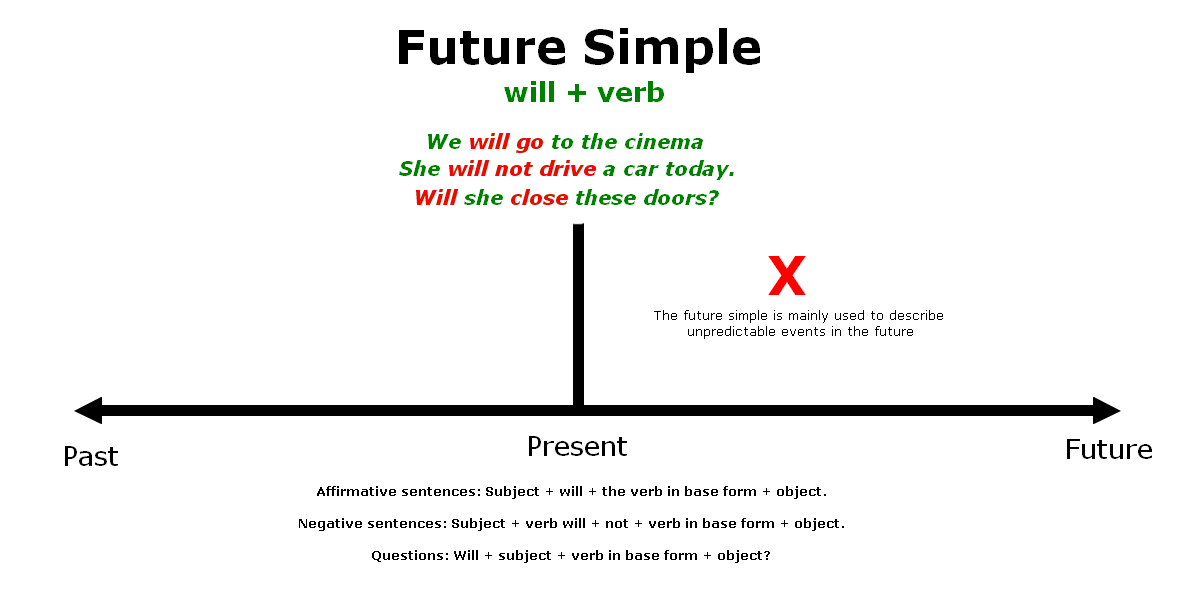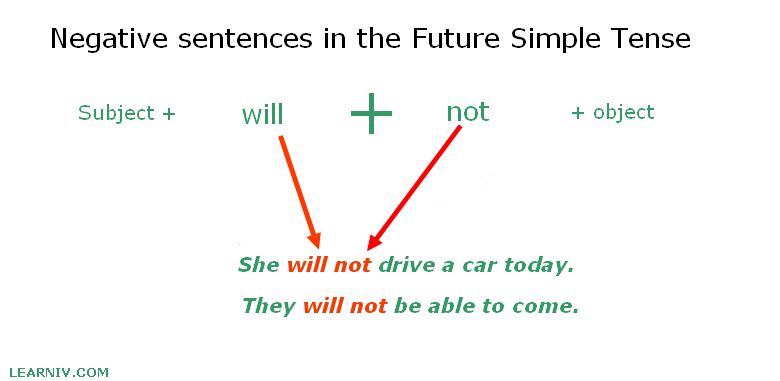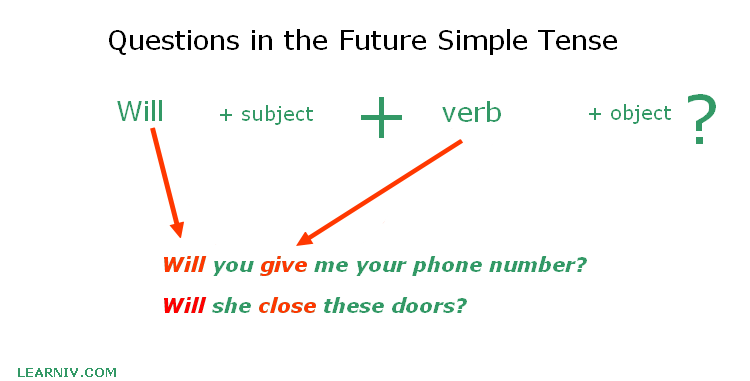The future simple tense (also known as the simple future) is used to express future events. It can be used to describe spontaneous decisions, predictions, plans, or any other event taking place in the future.
This tense uses two basic auxiliary verbs to express the future – “will” and “going to”. Both of these verbs fall under the future simple tense and are used in its formation.
The verb “will” is mainly used to describe unpredictable events in the future. In contrast, the verb “going to” describes events that are planned.
Look at the future simple tense examples.
Sentence structures
No special knowledge is needed to form sentences in the future tense, you just need to know what the sentence structure looks like. Sentences using the verbs “will” and “going to” are formed quite
differently.
The verb “will” is probably the easiest to construct a complete sentence with as we don’t need to remember any special rules – all we need is a sufficient vocabulary.
In contrast, when using “going to” we need to differentiate between the number and type of person to identify the correct form of “to be” to use. As such, this is the more difficult form of the future simple tense.
The verb WILL
The verb WILL is one of the most frequently used verbs to express the future. Therefore, we must know when to use it during sentence formation.
Affirmative sentences using the verb WILL
Affirmative sentences in the future tense are relatively easy to construct. We simply use the auxiliary verb “will” followed by the main verb in its base form.
The structure of affirmative sentences looks like this:
Subject + will + the verb in base form + object.
Example:
- I will do that.
- We will go to the cinema.
- She will come late.
Negative sentences using the verb WILL
To construct a negative sentence in the future tense, we need to add the auxiliary word “not” right after the verb “will”. The “not” is an adverb expressing the negative meaning of the sentence.
The rest of the sentence looks very similar to that of an affirmative sentence. Here too, we do not use irregular verbs or any suffixes. The sentence will look like this:
Subject + verb will + not + verb in base form + object.
Example:
- I will not learn this!
- She will not drive a car today.
- They will not be able to come.
Questions
Forming questions in the future tense using the verb “will” is just a matter of slightly changing the word order. While in affirmative and negative sentences the verb “will” occurs in the middle of the sentence, in questions we put it at the very beginning of the sentence. The rest of the sentence is the same as in the previous examples. Irregular verbs or timing do not apply.
The structure of questions using the verb “will” look like this:
Will + subject + verb in base form + object?
Example:
- Will you give me your phone number?
- Will she finally close these doors?
- Will you come over tonight?
When do we use WILL in the future simple?
The verb “will” can be used in many ways as it describes ideas, promises, unplanned events, etc. in the future.
However, it is important to remember that we do not use this verb to express planned actions and events. If we know that an event will occur with 100% certainty in the future (the event is planned), we use the future simple tense with “be going to”.
The future simple tense uses WILL in the following cases:
Spontaneous decisions
If a future action or situation occurs that was not planned, the verb “will” is used. Similarly, we use this verb to express a spontaneous decision or any other event that was not anticipated.
Example:
- Come on, we will go there only for a few minutes.
- Will we go shopping after lunch?
- We are going to grill pork tonight, will you join us?
Wishes and hopes
We use the verb “will” when we hope that a particular situation will occur in the future. This could be wishing for good weather or wishing for something to happen or not to happen. In these cases, we usually also use verbs such as “hope” or “wish”.
Example:
- I hope we will make it.
- We wish it will rain tomorrow.
- She hopes I will find her keys at home.
Expressing an opinion
We use the verb “will” when we have an opinion about something that has not yet happened. Since we don’t yet know whether we are wrong or not as we are simply speculating, we express this using the verb “will”.
Example:
- I think she will not like this.
- He thinks we will come late.
- They think she will bake a birthday cake.
Promises
When we make a future promise to someone, we use “will”. These can be serious and binding promises, but they can also be promises used in casual conversation. Terms like “really”, “promise” or “do” are often used in these instances.
Example:
- I will really do that.
- They promised me they will come on time.
- I promise you I will not put apples into this pie.
Offers and requests
When you offer to help someone, ask someone for something or make a request, we use the verb “will”. These can be serious requests in formal letters or they can also be informal requests of those around you.
Example:
- May I ask you something? Will you help me with moving my furniture?
The verb “be”
When the main verb in a sentence is “be”, we can also use “will” for planned actions and events in the future.
Example:
- I will be in Paris next Tuesday.
- She will be at work tomorrow.
Abbreviations of the verb WILL
Abbreviations are used for almost every auxiliary verb in English. The verb “will” and its negative form “will not” are no exception. These abbreviations save some time when speaking and writing long messages, but they also simplify the flow of conversation. We only use abbreviations when talking to friends, family or in other informal conversations.
It is important to know that we never use abbreviations when having formal conversations or speaking with, or writing to, an important and respected person. We always use full verb forms for conversation in the formal company as using abbreviations in these instances can be considered rude and disrespectful.
Abbreviation of WILL
To abbreviate the verb “will”, we use its abbreviation “‘ll”, apostrophe included. This abbreviation is always added immediately after the subject. Once again, we do not differentiate between the number or the type of person in the subject.
- I will –> I’ll
- You will –> You’ll
- He/She/It will –> He’ll / She’ll / It’ll
- We will –> We’ll
- They will –> They’ll
Abbreviation of WILL NOT
The combination of “will” and “not” can be abbreviated to “won’t”. This abbreviation is used in sentences with a negative meaning and is quite common in most conversations.
- I will not –> I won’t
- You will not –> You won’t
- He/She/It will not –> He won’t /She won’t /It won’t
- We will not –> We won’t
- They will not –> They won’t
The verb GOING TO
The verb “going to” is also used to express the future simple tense. It is used for predictions, intentions or unchanging plans in the future.
To form the future tense using the verb “going to”, we use the verb “to be” in the appropriate form, the auxiliary verb “going to”, and the main verb in its base form.
Sentence structure
It does not take much knowledge of the English language to be able to construct a sentence using the form “going to”. We just need to know how to modify the verb “to be” into the correct form, depending on the subject.
It is always necessary to differentiate between the type of person and number of pronouns so that we know when to use which form of the verb “to be” (am/is/are). Once it is clear which form to use, only the auxiliary verb “going to” is added along with the main verb in its base form.
The general structure of the sentence looks like this:
Subject + to be + going to + verb + object.
The verb TO BE
In order to know how to properly form a sentence with the verb “going to“, it is necessary to know how to use the verb “to be”. The verb “to be” changes depending on the number and person in subject to the forms “am, are, and is”.
The irregular form “am”
The form “am” is used in combination with the 1st person singular (I am). We can also use its abbreviation (I’m).
Example:
- I am going to live in Germany.
- I’m going to fly to NY next Monday.
The irregular form “is”
This form of the verb is only used in combination with the 3rd person singular (He, She, It). It is also very common to see it abbreviated with an apostrophe (‘s).
The abbreviation looks like this:
He is –> He’s, She is –> She’s, It is –> It’s
Example:
- He is going to be a very clever guy when he grows up.
- She‘s going to bake a cake.
- It is going to fall down.
Irregular form “are”
This form is used to talk about the 2nd person singular (you) or plural pronouns (we, you, they). We can also use its abbreviation (‘re) instead, apostrophe included.
The formation of abbreviations looks like this:
We are –> We’re, You are –> You’re, They are –> They’re
Example:
- You are going to wash the dishes.
- They‘re going to paint a wall.
- We are going to live with our parents.
When to use the verb “going to”
The verb “going to” expresses events in the future that have been planned before the sentence is spoken. The event is planned, is unlikely to change and will happen regardless. The verb “going to” is more accurately used for:
Announcing plans
The future simple tense is most commonly used to express future plans using the verb “going to”. In English, these sentences can be translated with the verbs “I am going to” or “I intend to”.
Example:
- I am going to visit my grandmother on Tuesday.
- We are going to fly to the Netherlands next month.
Intentions
Another example where the form “going to” is used is to express any future intentions. We use this form anytime we intend for something to occur. Caution! Do not confuse intentions with wishes.
Example:
- I have sold my house because I am going to move to LA.
- When she grows up she is going to be a doctor.
Predictions
When we predict an event in the future (something that is perfectly obvious), we use the verb “going to”.
Usually, we only express events that are most likely to happen and where we can predict their unfolding according to some type of evidence. These predictions are referred to in literature as the “near future”.
Example:
- He is probably going to be late. (He called to say that he was stuck in traffic, so I conclude that he will be late).
- It is going to rain. (We see black clouds in the sky).
Commands
If we are letting someone know of an obligation or have a command, we use the form “going to”. Often these types of commands are made by parents or supervisors.
Example:
- You are going to clean this!
- You are going to write this article again! Understand?
Most of the time, these sentences are passive-aggressive.
Abbreviation of the verb “going to”
As with all other tenses, abbreviations are also used in the future simple tense. While the verb “will” is abbreviated with “‘ll”, the verb “going to” is a completely new word – we are talking about the verb “gonna“. This form was created by native speakers in an informal speech by contracting the original form of the verb.
Abbreviations are generally used in conversation with friends, family or loved ones and are commonly used in informal speech.
The form “gonna” can also be used without a subject but only if it is 100% clear what is being talked about.
Example:
- Gonna be there in a minute.
- I’m gonna do it!
- Are you gonna drink it?
- We’re gonna miss the train.
- You’re not gonna believe this! Do you know what she did?
Going to go, going to come
English often tries to avoid the combination “going to go” or “going to come”. Instead, only the present continuous tense is used with the verbs “come” and “go” to express the future.
Example:
- I am going to go shopping –> I am going shopping.
- He is going to come tomorrow –> He is coming tomorrow.
Both sentences mean the same thing, but the shortened form without the verb “going to” is used much more often. Some professors even say that the forms “going to go” or “going to come” don’t even exist, so make sure to avoid using them altogether.




